What is Modern Management in Business | Theories, Approach, and Tools
In the evolving world of business, the way teams are managed is also progressing. Modern management is a shift from all the traditional management techniques and is towards a more collaborative and adaptable way of managing teams. It recognizes the importance of the factors that basically motivate employees.
Modern management identifies that employees are not only motivated by paychecks, but leveraging technology, prioritizing building trust and fostering is highly significant for better results and outcomes. This article is a description of the key principles of modern management and explores the tools and strategies to power it.
1What is Modern Management in Business?
What is Modern Management Theory?
In easy terms, Modern Management Theory provides guidance on all those techniques and practices that are highly important in order to streamline all the processes as well as employees in an effective manner. It is a combination of approaches that makes it possible for business owners to understand business operations and help them in the identification of multiple internal and external factors that basically affect their business.
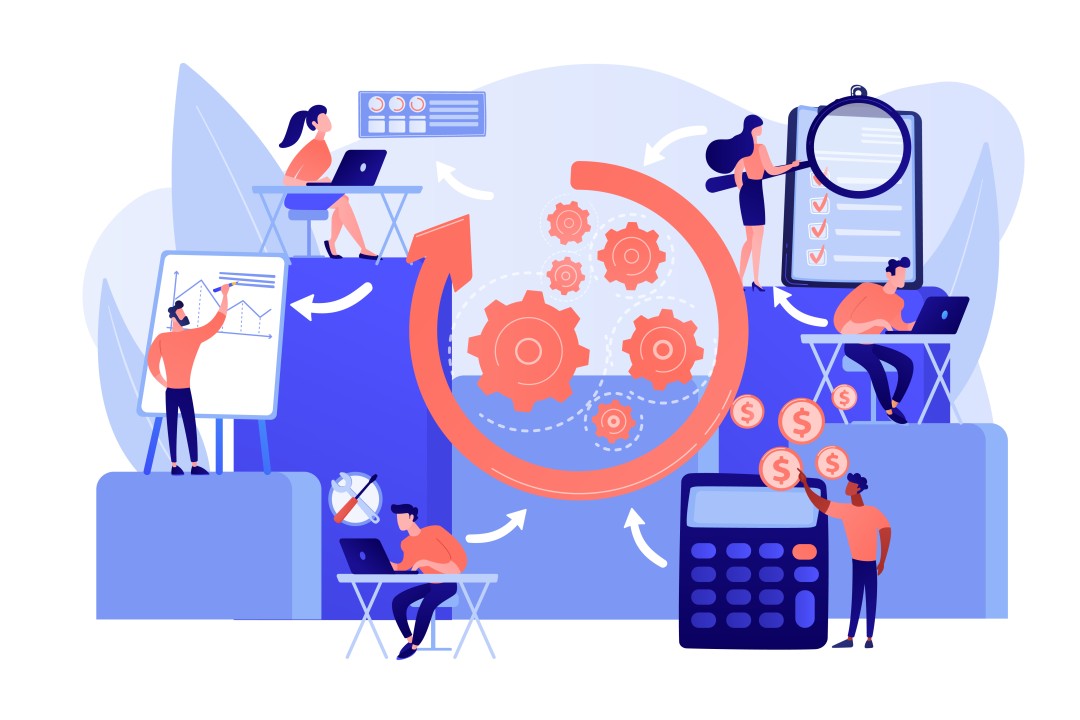
The difference between modern and traditional management Theory
Both traditional management theory and modern management theory differ from each other in multiple different ways. Modern management theory realizes the fast-paced changes and complexities that exist. The theory of modern management has a fundamental point that technology is the potential cause as well as a solution for these complexities. Whereas traditional management believes that workers mainly work for monetary gains, modern management techniques in contrast appreciate using mathematical techniques for better data-driven data and it ensures that managers make decisions purely on results rather than personal opinion and feelings.
The benefit of Modern Management Theory
Following is a list of benefits of adding modern management theories in organisations:
1. Boost Productivity:
The mathematical techniques allow managers to assess the performance of employees through data. Such statistics can be helpful in making solutions for the maximisation of the productivity of the workforce.
2. Increased Employee Engagement:
Modern management understands that there is more world rather than financial gains. The techniques it involves allow managers to keep their teams motivated, increasing their morale and realising the varying needs of employees.
3. Better Decision Making:
As mentioned above, the use of mathematical techniques allows managers to make data-driven decisions and assess the performance of the employees. Such decisions are not focused on specific feelings or interests.
4. Adaptable Theory:
One of the main benefits of modern management is that it is very adaptable to all new changes and encourages the usage of multiple approaches and techniques to streamline certain processes.
2What is the Element and Approach of Modern Management Theory?
There is not just a single idea in Modern Management Theory, but rather is a collection of different ideas that are primarily focused towards flexibility, and adaptability in today’s complex working environment. Following are some of the elements as well as approaches of Modern Management theory:
Focus on People
This element ensures that see employees as valuable resources and assets. The focus is not on the motivation of employees through just money, but building trust, open communications and fostering creativity are also motivating factors.
Data-driven Decision-making
The use of data analytics, statistics and other quantitative methods are used to make informed. decisions reduce biases.
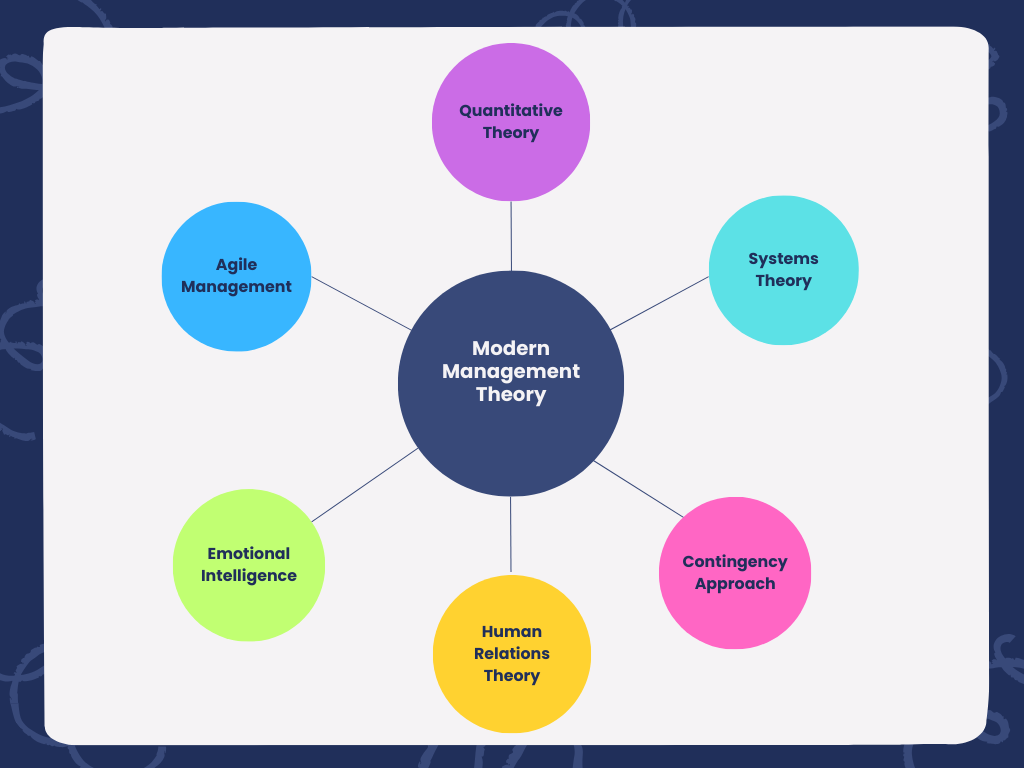
Apart from such points following points are counted as elements of Modern Management Theory:
Quantitative Theory
The use of this theory uses mathematical techniques such as statistics, and data analytics for the calculations of factors such as drawbacks, benefits and risks before getting to make a decision. This can be done through computer simulations, quantitative techniques, and statistical analytics. But It is even better if you combine the humanistic factors and theories with such a quantitative approach as it ensures better decision-making along with better employee well-being.
Systems Theory
This theory says that an organization is not a single entity but a combination of interconnected parts. The management of teams could be highly effective if the independence of such components of the organization could be understood. It is a way where different departments work together to achieve goals. It basically focuses on a collaborative working environment.
Contingency Approach
Contingency theory is specific towards managers making decisions and handling situations in their own ways. There is no “one size fits all” solution in this theory and the approach is highly specific towards the culture of the organization, its industry as well as its size.
Human Relations Theory
This specific human relations theory focuses more on the needs as well as the motivation of employees. This theory takes employees more than just resources and focuses on them as unique individuals with different personalities. A good working environment can allow managers to build connections as well as trust among their employees.
Emotional Intelligence
This theory is primarily focused on understanding the emotions of own as well as others. If a manager has good emotional intelligence skills, it is really easy for him or her to build relations, communication and all with their employees.
Agile Management
Agile is a way of work which boosts productivity and collaboration among employees, There is always continuous improvement in agile management and allows and encourages taking actions collaboratively, making quick business decisions and experimentations.
Just like the ideas explained above, Mobile Device Management solutions are highly effective in executing modern management techniques. The goal is the same, which is to utilise technology for better management and increased productivity of employees within an organization.
3Best Practice of Modern Management
Modern management is not just specific rules, but it is a combination of ideas and approaches which are adaptable to various departments as well as industries. Below are some of the examples:
1Technology Industry: Agile Development
Challenge: It is really to keep speed with the fast technological environment and ever-evolving customer needs.
Agile development, which is the core part of Modern management theory, excels in the tech industry. It breaks down projects into smaller projects, to be performed into iterative cycles, with such practice, companies are able to receive continuous feedback and adapt their products quickly. This allows them to stay ahead of the curve.
2Healthcare Industry: Data-Driven Decision Making
Challenge: Making patient care better while managing costs in a complex healthcare environment.
Modern Management Techniques focus on data-driven decision-making. Hospitals can make use of data analytics to track patient outcomes, identify areas for betterment, and make use of the resources efficiently. This leads to better patient care and informed financial decisions.
2Manufacturing Industry: Empowering the Workforce
Challenge: Motivating a large workforce and increasing efficiency in production lines.
Modern Management provides Employee empowerment, and it helps them to take ownership of their tasks and make decisions at a specific time. This provides them with a sense of responsibility and increases engagement, leading to higher productivity.
4What are the principles of modern management
There are some specific principles stated below for modern management.
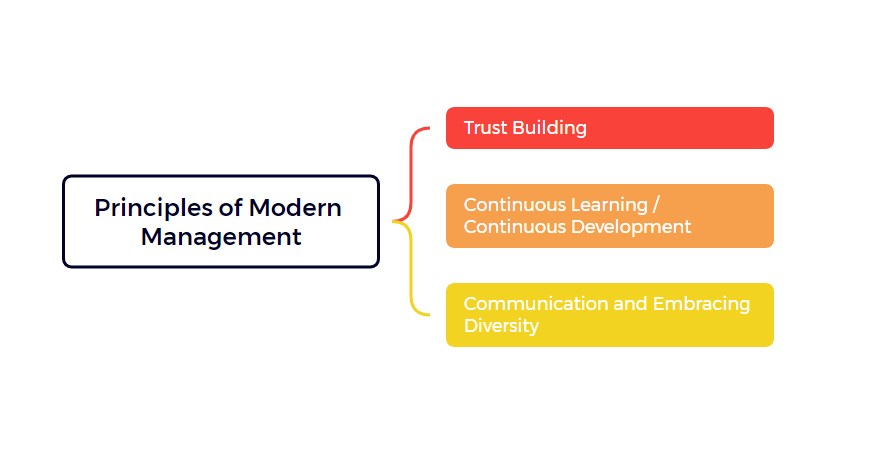
1. Trust Building: Modern Management helps managers to keep a connection with the employees and provides them with the authority to make decisions and take initiative by themselves.
2. Continuous Learning / Continuous Development: There are no specific sort of rules and skills that need to be learned by the employees. Modern management provides a landscape that keeps the team continuously learning new skills.
3. Communication and Embracing Diversity: The environment must be capable of understanding multiple views and sharing a wider range of ideas. The idea of building strong relationships and maintaining transparency can only be done through effective communication.
5 Tools for Modern Management
For better and modern management, the following tools are recommanded to be used.
1. Project management software: Asana and Trello: Project management tools to assign tasks and it allows teams to collaborate.
2. Customer relationship management (CRM) system: Salesforce: It manages all aspects of customer interactions.
3. Cloud-based solutions: They allow accessing software and data from anywhere specifically for remote work
Virtual meeting platforms: Zoom and Microsoft Teams: Allows online meetings and collaboration.
4. Automation tools: Zapier and IFTTT: Automate the tasks which are repetitive for freeing up human time.
5. Analytics software: Tableau and Google Analytics Allow making better and data-driven decisions through insights.
6. Mobile Device Management Tool: One tool that can be useful for modern management is Mobile Device Management (MDM).
MDM helps companies to secure and manage employee mobile devices, ensuring company data is protected and devices comply with security policies. It also helps in increasing the productivity of employees.
If we take an example of MDM software, then AirDroid Business is a comprehensive MDM solution that offers a variety of features to help businesses manage their mobile devices. These features include:
- Remote device management: Lock, wipe, or locate lost or stolen devices.
- App management: Deploy, update, and remove apps on devices.
- Security features: Enforce strong passwords, restrict access to certain apps and websites, and track device activity.
- Content management: Securely share files between devices and computers.
By using MDM tools like AirDroid Business, organizations can improve security, streamline device management, and ensure employee productivity.
FAQs
1. Reviewing Management Options: - get to know your current Windows 10 management tools (e.g., Group Policy).
2. Deployment and Provisioning: - understand cloud-based solutions like Microsoft Endpoint Manager (MEM) for deploying and configuring devices remotely.
3. Identity and Authentication: - Consider integrating Azure Active Directory (AD) for centralized user authentication and access control.
4. Settings and Configuration: - Use MEM policies to control device settings (security, Wi-Fi, updates)
5. Updating and Servicing: - Use cloud-based update management for automatic OS and application updates.
6. Begin Modernization: - Microsoft gives resources and documentation to help with this transition. Consider seeking professional help for a smooth and proper migration.








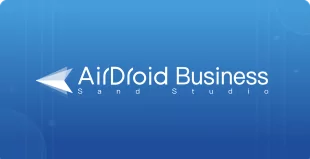
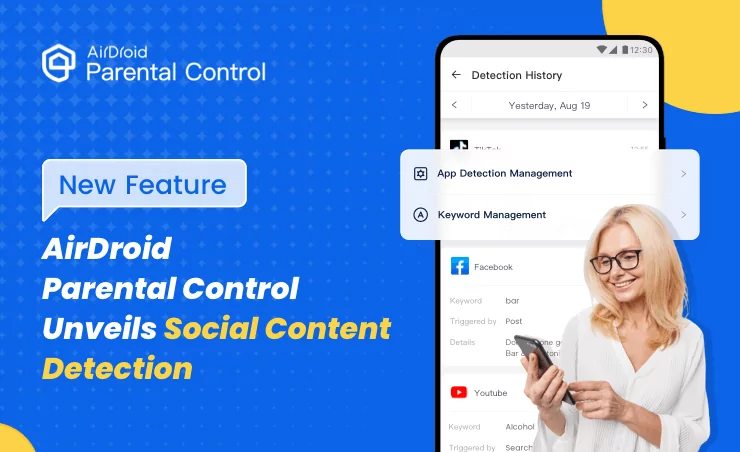
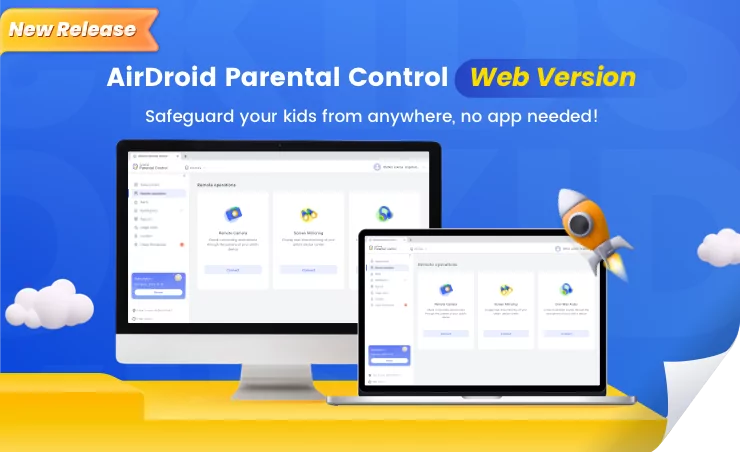


Leave a Reply.